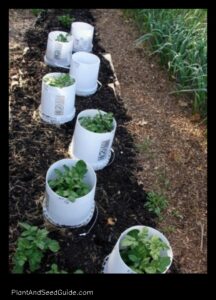When it comes to planting Bermuda grass in North Carolina, timing is everything. Whether you’re aiming for a lush green carpet or a resilient lawn that can withstand the region’s climate challenges, choosing the right time to sow your Bermuda grass seeds is crucial. Let’s dive into the ideal planting windows and strategies that can help you achieve a vibrant and thriving lawn in North Carolina.
Understanding Bermuda Grass
When it comes to Bermuda grass, understanding its characteristics and benefits is key to achieving a vibrant and resilient lawn in North Carolina. This warm-season grass is renowned for its drought tolerance, making it an excellent choice for areas with hot and dry summers. Additionally, Bermuda grass is prized for its durability and ability to thrive in various soil types, from sandy to clay soils.
Here are some key points to consider when delving into the world of Bermuda grass:
- Drought Tolerance: Bermuda grass can withstand long periods of dry weather, making it a suitable option for regions with water restrictions.
- Durability: This grass variety is known for its resilience, recovering quickly from stressors such as foot traffic or extreme weather conditions.
- Soil Adaptability: Bermuda grass can thrive in different soil types, but it performs best in well-draining soils with good aeration.

Climate Considerations in North Carolina
When it comes to planting Bermuda grass in North Carolina, understanding the climate considerations is crucial for ensuring the success of your lawn. North Carolina experiences a diverse climate with varying temperature fluctuations and precipitation patterns throughout the year. These factors play a significant role in the growth and establishment of Bermuda grass, impacting its overall health and resilience.
In North Carolina, the summers can be hot and humid, while the winters are relatively mild. This unique climate poses challenges for maintaining a lush lawn, making it essential to choose the right grass variety that can thrive in such conditions. Bermuda grass stands out as an excellent choice due to its ability to withstand heat, drought, and varying soil types.
Additionally, the coastal areas of North Carolina may experience salt spray, which can affect the growth of Bermuda grass.
By considering these climate factors, you can determine the best practices for planting and caring for Bermuda grass to ensure a vibrant and resilient lawn year-round..
Spring Planting
When it comes to planting Bermuda grass in North Carolina, spring is the perfect time to kickstart your lawn transformation. During this season, the soil temperature begins to warm up, creating an ideal environment for Bermuda grass seeds to germinate and establish strong roots. But why is spring the optimal time for planting this resilient grass variety? Let’s dive into the reasons:
- Strong Root Development: Spring planting allows Bermuda grass to develop robust root systems, enabling better nutrient absorption and overall plant health.
- Vigorous Growth: With the longer days and increasing temperatures of spring, Bermuda grass experiences rapid growth, filling in your lawn with lush greenery.
- Less Competition: By planting in spring, you give Bermuda grass a head start over weeds, minimizing competition for essential resources like water and sunlight.
So, if you’re aiming for a vibrant and resilient lawn in North Carolina, seize the opportunity of spring to plant Bermuda grass and set the stage for a thriving outdoor oasis.
Fall Planting
When it comes to planting Bermuda grass in North Carolina, fall is an opportune time that offers several advantages for establishing a lush and resilient lawn. The cooler temperatures during the fall season create a favorable environment for Bermuda grass to take root and thrive. Additionally, planting in the fall helps to reduce weed competition, allowing the grass to establish itself more effectively without competing for resources.
Here are some key considerations to keep in mind for fall planting of Bermuda grass in North Carolina:
- Cooler Temperatures: Fall planting allows Bermuda grass to establish before the winter months, taking advantage of the milder temperatures that promote healthy growth.
- Reduced Weed Competition: Planting in the fall helps Bermuda grass outcompete weeds, leading to a healthier and more uniform lawn in the following year.
- Root Development: By planting in the fall, Bermuda grass has ample time to develop strong roots, which are essential for withstanding the challenges of the upcoming seasons.
Preparing the Soil
When it comes to preparing the soil for planting Bermuda grass in North Carolina, attention to detail is key for ensuring a healthy and thriving lawn.
Here are some essential steps to consider:Proper soil preparation techniques play a crucial role in the successful establishment of Bermuda grass..
- Soil Testing: Before planting Bermuda grass, conduct a soil test to determine the pH level and nutrient content of the soil. This information will help you make informed decisions about necessary amendments.
- Nutrient Amendments: Based on the soil test results, add any necessary nutrients, such as nitrogen, phosphorus, and potassium, to ensure optimal growth and development of Bermuda grass.
- Proper Soil Aeration: Aerating the soil helps improve drainage, reduce compaction, and promote root growth. Consider aerating the soil before planting Bermuda grass to create an ideal environment for root establishment.
By following these soil preparation techniques, you can set the stage for a successful Bermuda grass lawn that thrives in North Carolina’s climate and soil conditions. Remember, a strong foundation leads to a lush and vibrant lawn that you can enjoy for years to come.

Maintenance Tips
When it comes to maintaining your Bermuda grass in North Carolina, there are several key tips to keep in mind for a vibrant and healthy lawn. One of the most crucial aspects is setting the mowing height at the correct level. Ensuring that you mow at the appropriate height helps promote root growth and overall grass health. Additionally, establishing a consistent watering schedule is essential. Adequate watering is vital for Bermuda grass, especially during hot and dry periods.
Another important maintenance practice is fertilization.
Consider conducting a soil test to determine the specific nutrient amendments needed for your Bermuda grass. Moreover, implementing effective weed control strategies is essential to prevent unwanted plants from competing with your grass for nutrients and space.Providing the right nutrients at the right time can significantly impact the health and appearance of your lawn..
Overwintering Strategies
When it comes to overwintering strategies for Bermuda grass in North Carolina, proper preparation is key to ensuring a strong and healthy lawn come springtime. One essential step is to adjust your mowing height gradually as winter approaches, allowing the grass to be slightly taller to protect the roots from frost damage. Additionally, applying a winter fertilizer rich in potassium can help the grass withstand colder temperatures and maintain its health during the dormant season. Consider overseeding any sparse areas in the fall to promote thick and lush growth in the following year. Finally, implementing proper protection measures, such as covering sensitive plants during frosty nights, can further safeguard your Bermuda grass from winter’s harsh conditions.
Frequently Asked Questions
- When is the best time to plant Bermuda grass in North Carolina?
The optimal time to plant Bermuda grass in North Carolina is during the spring season. This allows for strong root development and vigorous growth during the active growing period.
- Can Bermuda grass withstand North Carolina’s climate?
Absolutely! Bermuda grass is well-suited for North Carolina’s climate due to its drought tolerance, durability, and ability to thrive in various soil types, making it a resilient choice for lawns in the region.
- What maintenance practices are essential for Bermuda grass in North Carolina?
Maintaining Bermuda grass in North Carolina involves practices like proper mowing height, watering schedules, fertilization, and weed control strategies to ensure a vibrant and healthy lawn.
- Wild Rose Country: Exploring Untamed Beauty - July 15, 2024
- Wildflower Nursery Decor: Bringing Nature Indoors - July 15, 2024
- Young Sprout of Grass: Nurturing New Life - July 15, 2024








